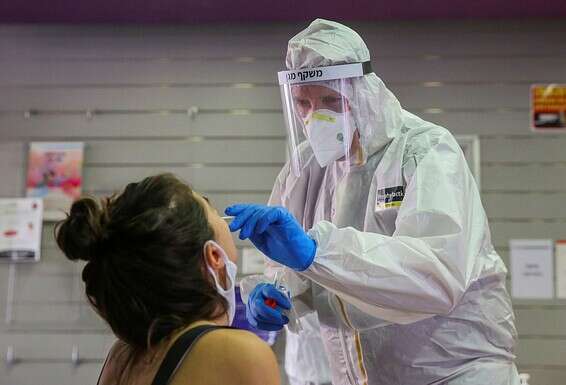Political clashes will delay the distribution of vaccines, new strains of the virus will challenge scientists, and each country will experience between six and eight waves of morbidity • In a conversation with Israel Today
The plague is likely to last five years
Photography:
Oren Cohen
"The plausible scenario is that the corona plague will subside within five years at the latest," Professor David Pasig, a futures researcher at Bar Ilan University, said today (Wednesday) in a conversation with Israel Today.
In recent months, quotes have been published in the name of the future researcher, Prof. Pasig, who serves as head of the Virtual Reality Laboratory at Bar Ilan University.
According to these things, the corona plague is not expected to end towards the end of 2021 with the spread of the various vaccines, and it will continue for a few more years.
It has also been argued that the world is moving towards an economically lost decade.
Following this, "Israel Today" turned to Prof. Pasig to state their accuracy.
From the YouTube channel of the State Comptroller and Ombudsman
"In February people quoted some of my remarks, in which I mentioned that 100 to 300 million people could take their lives too soon over the next decade. Did not mention that I said it was just a case of us drifting towards herd immunity as has happened in epidemics over thousands of years. "Until the virus fades and they do not bother to say in my name that the current epidemic will be relatively short compared to previous epidemics," Prof. Pasig clarified.
What is expected and how should the epidemic be prepared for?
"First, in the study of epidemics of this type, simulations have been conducted that weigh a large number of variables and therefore their reliability is high. Many experts publish estimates for the development of the coronary epidemic, but they do so from just one area of view. "Multidisciplinary areas that weigh a lot of points of view, such as the economy, society, security, politics and more."
"With this approach, very reliable simulations have been published in recent months that indicate that the probable scenario, ie with a 70 percent probability, is that the epidemic will have between six and eight waves."
"Some people may be intimidated by this assessment," Pasig added, "but in the past when there was no science, it sometimes took two decades for the epidemics to disappear completely and return in many waves. Cholera, for example, returned in six waves and only a herd vaccine reduced the virus." "Such people would sometimes last for many years, disappear for a few years and strike again with greater intensity. The world would only come out of the plague when herd immunity was achieved."
Pasig stressed that despite this, "Today humanity is in a completely different place. We have developed sciences, abundant monitoring technologies, sophisticated statistical models and more. So this epidemic will fade relatively quickly. But we all need to make sure it does not fade only in herd immunity. I know people want to say "It will fade very quickly, that is, very soon. But anyone who looks at and researches the subject with multidisciplinary tools knows that it is a long process. It is important that people are aware of it and understand it. In this way we can strengthen private and national resilience to survive."
Global pace, politics and new varieties
Prof. Pasig explained that there are three variables that are important to note in dealing with the global epidemic.
"First, there is something here that humanity has never experienced before in its intensity. It is an epidemic that within two months has reached all corners of the world. In the past epidemics moved more slowly and over years barely skipped continents. This time because of globalization in every field. .
"Many think that there will soon be a vaccine and everything will be behind us. What they have a hard time seeing is the logistical and political aspect of producing and transporting vaccine packages to the eight billion people living on the planet. Besides, many corona strains and more will be reported. "New if not real mutations. Beyond that, no one currently knows how long the antibodies will last in the bodies of the vaccinated. Usually a flu vaccine provides antibodies for three months. And even so, they protect about 60 percent of the vaccinated."
The expert added that "there is always a large group that even if they are vaccinated - they are infected with the seasonal flu virus. All groups that try to develop a vaccine target the reliability of 50% of the vaccinated who will not be infected. What about the remaining 50% who are vaccinated? Vaccines on the way will be enough for weeks or at most a few months of antibodies, as reported in various studies? This means that every few months the population needs to be vaccinated again. And yet we have not talked about the costs surrounding this saga and the fact that vaccine development is expensive. to do this".
Vaccine development is just the beginning
According to Prof. Pasig, the development of a vaccine is only the beginning of the process of dealing with the plague.
"Developing the vaccine alone is not enough. It will have to be distributed to the population, and vaccinating eight billion people in the world is a very big challenge. The nightmare of decision makers will be in the first stage, when each country will receive a certain number of vaccine doses already paid for. In total, about a million future dishes. "
What about the rest of the residents?
"It is very likely that a moral debate will begin, exhausting and laden with politics and interests on who to give the vaccine first. For adults in the risk group or for young people to move the economy? Governments in such situations function less well and decisions are made more slowly. "There will be opinions here and there and it will be necessary to make decisions that derive a question of who to favor and who to clone. These discussions and conflicts should also be taken into account when talking about the length of time and side effects of dealing with the corona."
Prof. Pasig went on to say that "many countries will have to rely on themselves to produce cheaper doses for their residents because no international company will give away the knowledge of the vaccine for free. In fact it can be estimated that there will be a global struggle over the number of doses." "This, we will probably go through between six and eight rounds of partial closure, opening of the market for existence and then after a few months partial closure. This conduct will allow the economy to survive and progress to a situation where there will eventually be enough rations for the epidemic to subside."
So when will the epidemic subside?
"This epidemic will fade, but it will only take up to five years, in the hope that it does not exceed two years from its inception. And it should be mentioned again that in the past epidemics lasted for decades in repeated waves. So there is nothing to be afraid of five years. "In February they said the epidemic would end in April, in April they said in September and so did today. And people always refuse to understand the continuation of crises of this kind."
All in all it is to our detriment that we do not see the whole and its reasonable continuation.
Too bad many see only the next month or two.
Decision makers need to understand that their job is to pull as much time as possible from wave to wave until everything is behind us, because in doing so countries will be measured if they managed to get through this mega-crisis safely whose consequences will accompany our children for decades into the 21st century.
And because of him, we will improve a lot of the systems that will turn out not to have stood the test. "









